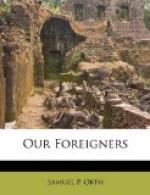These colonies took root at a time when profound social and religious changes were occurring in England. Churchmen and dissenters were at war with each other; autocracy was struggling to survive the representative system; and agrarianism was contending with a newly created capitalism for economic supremacy. The old order was changing. In vain were attempts made to stay progress by labor laws and poor laws and corn laws. The laws rather served to fill the highways with vagrants, vagabonds, mendicants, beggars, and worse. There was a general belief that the country was overpopulated. For the restive, the discontented, the ambitious, as well as for the undesirable surplus, the new colonies across the Atlantic provided a welcome outlet.
To the southern plantations were lured those to whom land-owning offered not only a means of livelihood but social distinction. As word was brought back of the prosperity of the great estates and of the limitless areas awaiting cultivation, it tempted in substantial numbers those who were dissatisfied with their lot: the yeoman who saw no escape from the limitations of his class, either for himself or for his children; the younger son who disdained trade but was too poor to keep up family pretensions; professional men, lawyers, and doctors, even clergymen, who were ambitious to become landed gentlemen; all these felt the irresistible call of the New World.
The northern colonies were, on the other hand, settled by townfolk, by that sturdy middle class which had wedged its way socially between the aristocracy and the peasantry, which asserted itself politically in the Cromwellian Commonwealth and later became the industrial master of trade and manufacture. These hard-headed dissenters founded New England. They built towns and almost immediately developed a profitable trade and manufacture. With a goodly sprinkling of university men among them, they soon had a college of their own. Indeed, Harvard graduated its first class as early as 1642.




